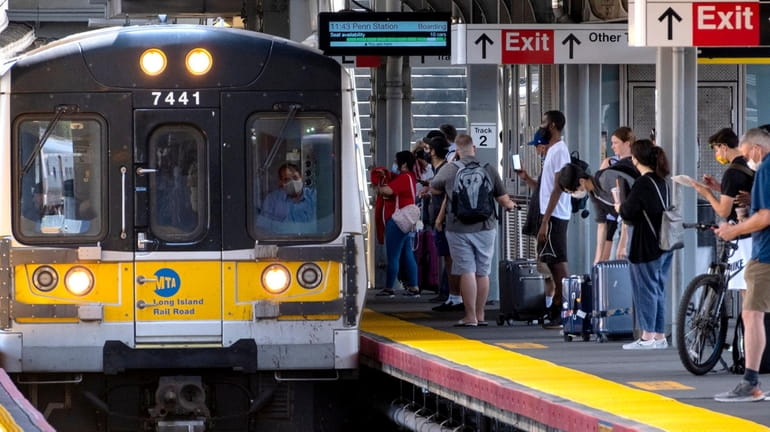Wanted: A few strong voices for LI riders

Come next year, two seats will open up on the Metropolitan Transportation Authority board to represent Long Island riders. Credit: Craig Ruttle
The task seems simple: Find two people who are respected, knowledgeable and active regional advocates, with streaks of independence and a willingness to use their voices to speak up for Long Island. An understanding of public transit is a must.
But as it turns out, there aren't a lot of people in Nassau and Suffolk counties who fit such a description.
So, when the two county executives start their searches for new Metropolitan Transportation Authority board members early next year, it may be easier said than done.
The MTA board is home to a fascinating cast of characters, some more vocal than others. It's a mix of transit advocates and political creatures, each answerable to an elected official. Every month, they gather publicly to mull fare increases and budget cuts, service changes and capital improvements, that impact subways, buses, Metro-North Railroad and, yes, the Long Island Rail Road.
Add to those meetings private discussions, relationship building and the broader importance of representation and it's clear just how impactful each MTA board seat is.
Come next year, both of Long Island's seats will open. Suffolk representative Kevin Law has announced his intention to step down after he's confirmed as Empire State Development chairman. In Nassau, representative David Mack's term officially ends with the term of County Executive Laura Curran, who seems to have lost her reelection bid.
In January it'll be up to the county executives — Steve Bellone in Suffolk and, in all likelihood, Bruce Blakeman in Nassau — to make three recommendations each. Gov. Kathy Hochul then will nominate one from each county for State Senate confirmation.
These appointments aren't made in a vacuum. Some picks are purely political; others push toward the most knowledgeable choice. Often, a county executive seeks the person whose views mostly align with theirs, or one who won't make waves.
But wave making might not be a bad thing right about now.
In the past, the region has enjoyed having local residents hold other board seats, like former MTA chairman Pat Foye and former gubernatorial appointee Scott Rechler. Right now, the region's only other member is LIRR Commuters Council representative Gerard Bringmann, who doesn't have a vote.
While Bringmann is a strong LIRR rider representative and Law has served as the kind of regional advocate the Island craves, Mack rarely speaks at board meetings, even on LIRR or Long Island issues. He said he'd "rather be behind the scenes than out in public, because that's where you get it done."
Mack, who hopes to be reappointed, has had a colorful history. He held the board seat more than a decade ago, but wasn't reappointed after he refused to cooperate with then Attorney General Andrew M. Cuomo's investigation into the State Police. Since then, Nassau's board seat has long been a spot Mack sought, but didn't always get.
Unfortunately, other picks haven't been much better. Four years ago, engineering firm chief executive John Molloy was rightly criticized for being too passive and unwilling to speak up even in the face of worsening LIRR service.
The current search may prove frustrating as the best outspoken, informed regional thinkers still must be found. But Bellone and Blakeman each have a few good options.
If they wanted to, they could choose smart voices who ride the trains and know the issues. That could make for a one-two punch in an often crowded room. And if Long Island commuters come out winners, ultimately, the elected officials could, too.
Columnist Randi F. Marshall's opinions are her own.

